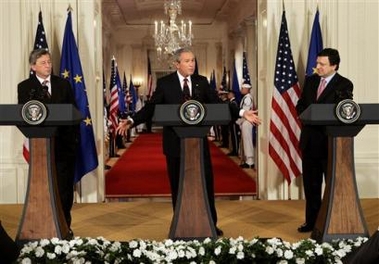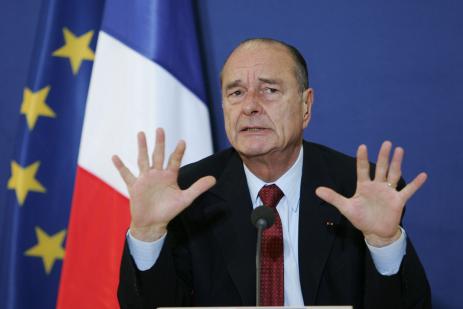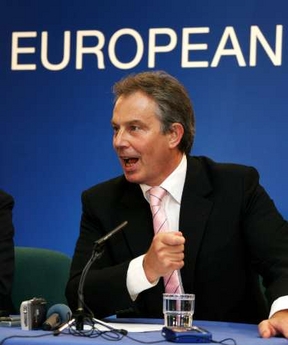Reflecting the sentiments of a critical mass amongst their citizens, it seems that European Heads of State have also become disaffected (if not disillusioned) with the prospect of ceding more national authority to the EU central government (Brussels). After all, their dramatic failure last weekend to agree on a budget to fund EU operations and subsidies beyond 2006 follows the equally dramatic (and prophetic) rejection of the EU Constitution just weeks ago by French and Dutch citizens.
Therefore, recriminations abound today over whether the Eurosceptic British or the Eurocentric French are most to blame for plunging Europe further into the throes of disunion. And, this diagnosis is no exaggeration given that of the two primary organs of EU viability – one is now dead (the Constitution) and the other is on life support (the budget).

After last weekend’s abysmal but sobering failure to agree on an EU budget, Luxembourg Prime Minister and European Union President Jean-Claude Juncker (L) and European Commission President Jose Manuel Barroso (R) rushed to Washington to assure President Bush that, despite France’s best efforts, America remains at the centre of European politics.
So, why are these enlightened European nations behaving and groveling like a bunch of banana republics?
Well, as it happens, a big row over agricultural subsidies to European farmers precipitated the budget fiasco. But this row constitutes only a small battle in the burgeoning civil war within the EU over more fundamental issues (not unlike those that confronted the framers of the US constitution over 200 years ago) – including separation of powers between Brussels and member nations; the power of Brussels to impose taxes (contributions to the EU budget) and the relative power of member nations to affect EU legislation.
Nevertheless, it (the row) not only compelled debate on these fundamental issues but also forced EU members to forge alliances along ideological lines which exposed irreconcilable differences between the warring factions. And, after positions became clear, Britain led one group that included the Italians, Danes, The Netherlands, Sweden, Spain and Finland; and France the other which included Germany, Belgium and Luxembourg (whilst the 10 newly admitted nations of Eastern Europe remained relatively neutral – no doubt in shock and wondering what the hell they’d gotten themselves into).
The first salvo in this latest battle was launched on the eve of last week’s EU budget summit by the French group. And, it took the form of a proposal by EU President Juncker (although it was generally known to have been submitted by France) for Britain to forego more than €18 billion (£11bn) that it is entitled to in rebates from its annual contributions to the EU budget over the next seven-year term.
But Britain counterattacked by insisting that it would consider a slight reduction in its earned rebate only if member states committed to reforming current EU budget expenditures – which now allocates 40% in set-asides for agricultural subsidies with the bulk of that going to “entitled” French farmers. In addition, and even more galling to the French, Britain proposed that France should also forgo some of the €10 billion in rebates it receives annually from the EU.

Absolument pas! President Chirac reacting to the Blair’s proposal that France gives up some of its farm subsidies so that the EU could fund more research and development to compete in the today’s highly technological global economy.
French President Jacque Chirac was apoplectic and even denounced Britain as “pathetic”. After all, he regards farm subsidies as not only an indispensable economic safety net for French farmers but also as a vital provision in the social (welfare) contract between Brussels and EU citizens. Therefore, he angrily dismissed any debate about his farm subsidies and insisted that the proposal to modify Britain’s rebate should “under no circumstances be linked to a reform of farm expenditure”. (Conspicuously, he skirted the challenge to make concessions on France’s EU rebates.)
But British Prime Minister Tony Blair remained adamant that not only should France reduce its own rebates but that it was unconscionable for France to insist on such high levels of subsidies for its farmers when farmers in much poorer EU countries – especially those in Eastern Europe – were getting pittance by comparison.

A defiant PM Blair: Bloodied but unbowed as he explains to his fellow heads of state that the UK is neither America’s poodle nor the EU’s bitch!
Ironically, Blair was supported in his capitalist and free-market stance, albeit in the form of backhanded concessions, by leaders of the 10 new (former socialist) members of the EU. Indeed, Prime Minister Marek Belka of Poland lamented that Chirac and Blair were afflicted by “egoism” and motivated by craven national interests – adding that “[no]body will be able to say that for Poland, the European Union is just a pile of money.” And, in that spirit of quixotic independence, each of these poorer EU member nations offered – much to France’s eternal shame – to forego as much of its own subsidies as it would take to break the EU budget impasse.
Unfortunately, by this point in the debate, the personal animus and philosophical differences between Chirac and Blair had become so pronounced that recourse to compromise was completely lost. Because, for Blair, this was a defining moment to set the EU on a proper course to meet the economic challenges of the 21st century. Whereas, for Chirac, it was an opportunity to make amends to his citizens for attempting to impose upon them an EU Constitution that would’ve breached their social contract for (cradle to grave) welfare guarantees.
Alas, Socialism is socialism – capitalism is capitalism and never the twain shall meet!
Incidentally, as an ironic footnote to this budget summit debacle, EU president Juncker raised the incomprehensible prospect of continuing the EU Constitution ratifying process – purportedly not so much towards implementing the document as furthering his “Plan D – for dialogue and debate.” Unfortunately, the almost universally cynical response was that his Plan D could also stand for “denial, defeat and even death.”
So goes the Europe’s Constitution, Budget and Union….
Note: This EU budget debate should disabuse anyone of the assumption that France’s special brand of political vitriol and obstructionism were reserved for President Bush and the United States. The schadenfreude in Washington is palpable. But Bush must be credited for disguising his glee so diplomatically during his meetings yesterday with chastened EU leaders at the White House.
News and Politics
Anonymous says
At the risk of gross over simplification, European leaders have been pushing forward an “unified” agenda for nearly two decades despite lukewarm support from their constituents. Perhaps the real surprise is that they have made it this far.
Rage in NJ
Anonymous says
Here, here! We’ve been suffering those fools in Brussels for far too long. The very idea of EU comes from cowardly French minds who thought they could do through political machinations what Napoleon tried to do militarily. Same arrogance, same result.